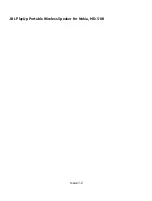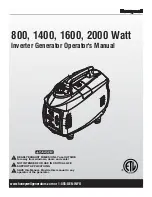
SPECIFICATIONS SUBJECT TO CHANGE WITHOUT NOTICE
4
INSTALLATION
1
2
3
4
WARNING
WARNING : To avoid possible personal injury
or equipment damage, a qualified electrician
or an authorized service representative
should perform installation and all service.
Under no circumstances should an unqualified
person attempt to wire into utility circuit.
Give the generator at least two feet of space from
any nearby wall to dissipate heat.
WARNING
WARNING : To avoid back feeding into
utility system, isolation of the residence
electrical system is required. Before
temporary connection of a generator to
the residence electrical system turn off the main
switch. Before making permanent connections a
double throw transfer switch must be installed.
To avoid electrocution or property damage, only
a trained electrician should connect generator
to residence electrical system. California law
requires isolation of the residence electrical
system before connecting generator to residence
electrical system.
A power line conditioner should be used when running
one or more of the following solid state items:
• Garage door openers.
• Kitchen appliances with digital displays.
• Televisions.
• Stereos.
• Personal computers.
• Quartz clocks.
• Copy machines
• Telephone equipment
Other solid state equipment may require a power line
conditioner, for more information contact customer
service.
To avoid back feeding into utility systems, isolation of
the residence electrical system is required.
Before temporary connection of the generator to
the residence system, turn off the main service
disconnecting device.
If your generator is to be used as a standby power
source in case of utility power failure, it should be
installed by a qualified electrician and in compliance
with all applicable local electrical codes.
Proper use requires that a double throw transfer switch
be installed by a qualified electrician so that the building’s
electrical circuits may be safely switched between utility
power and the generator output; thereby preventing feed
back into the utility electrical system.
Always follow local codes and regulations that apply to
OPERATION vOLTAGE
CAUTION
C A U T I O N : Operating voltage and frequency
requirements of all electronic equipment should
be checked prior to plugging them into this
generator. Damage may result if the equipment
is not designed to operate /- 10% of voltage
and +/- 3 Hz of the rated values marked in the
generator nameplate. To avoid damage, always have
an additional no solid state load plugged into the
generator if only solid state equipment (such as a
television set) is used. A power line conditioner is
recommended for some solid state applications.
NOTES:
Continuous Service Power Rating.
Continuous rated power,
continuous power or simply rated power, is the amount of
wattage the generator can supply on a continuous basis. It
is frequently said that continuous power is the real power
the generator can supply continuously under determined
conditions. Continuous service means operation for periods
of a few hours at a time, not 24 hours a day for days. It also
implies to supply a unity PF load (resistive only load), with an
ambient temperature less or equal to 68 ºF (20º C) and an
altitude less or equal to 1000 ft (300 m) above sea level. This
type of service is also called S1 Service.
Standby Service Power Rating.
Or standby power, is the
amount of wattage the generator can supply operating with an
overload of 10% above the Continuous Service Power Rating.
Generator shall be capable to operate under standby service
conditions for periods of around 1 hour at a time. This type of
service is also called S2 Service.
Maximum Power Service Rating.
Or maximum power, is the
amount of wattage the generator can supply operating with an
overload of 15% - 20% above the Continuous Service Power
Rating. Generator shall be capable to operate at a maximum
power service conditions for periods of up to 5-10 min every
hour. This type of service is considered the service adequate for
motor starting of motors of standard or low starting torque (no
letter code or letter code A as defined by the National Electrical
Code). Most of generator manufacturers restrict the extra-power
demand for starting electrical motors the generator can support
to this maximum. Some manufacturers call this Maximum
Power Service Rating as Running Power, these names are
synonyms. This type of service is also called S6 Service.
Maximum Service Power Rating shall not be confused with
Surge Service Power Rating
which is a higher one and
equal to 2 – 2.5 times the Continuous Service Power Rating.
Generator shall be capable to operate under surge power
service conditions for periods of 10 s max. every hour. This
type of service is considered the service adequate for motor
starting of motors of heavy or high starting torque, i.e. a high
surge power service rating ensures that induction motors that
have a high starting current requirement can be started.





































